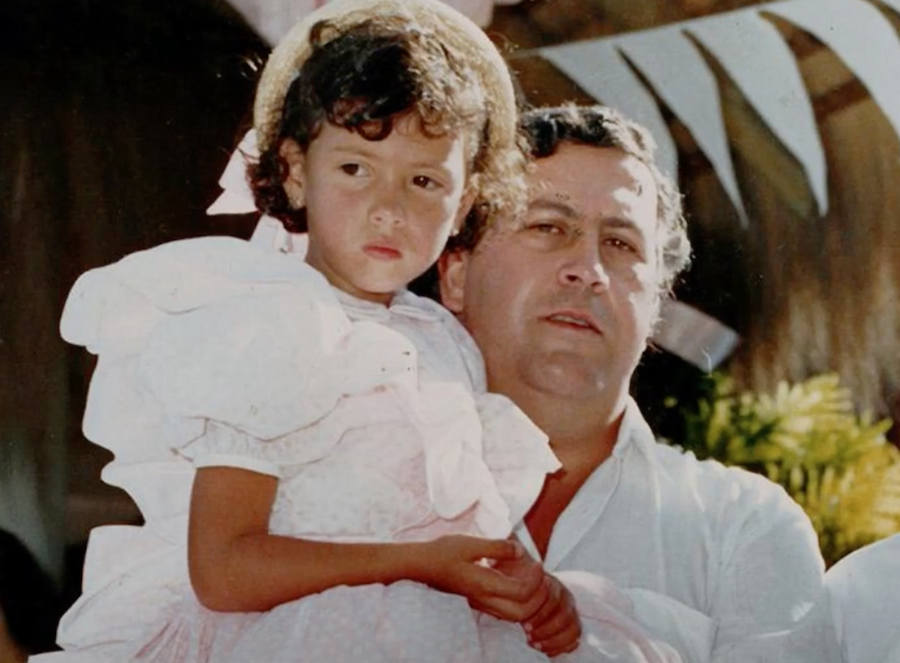Can a life be defined by the sins of another? Manuela Escobar, the daughter of the infamous Pablo Escobar, is living testament to the enduring power of a name and the inescapable shadow it casts, even on those who have never broken the law.
Born on May 25, 1984, in the heart of her father's cocaine empire, Manuela Escobar's life was a paradox. While her father, the notorious drug lord, sowed chaos and violence throughout Colombia, she was afforded a childhood of unimaginable luxury and privilege. This existence, however, was irrevocably shattered in December 1993, when Pablo Escobar was gunned down in a police operation, leaving Manuela, then just nine years old, to grapple with the devastating consequences of his legacy. Despite her innocence and complete lack of involvement in her father's criminal enterprises, Manuela has been forced to navigate a world forever shaped by the weight of his crimes. She is, in essence, a victim of association, a constant reminder of a past she did not create but can never fully escape.
| Category | Details |
|---|---|
| Full Name | Manuela Escobar Henao (also known by various aliases) |
| Date of Birth | May 25, 1984 |
| Place of Birth | Medelln, Colombia |
| Parents | Pablo Escobar (father), Maria Victoria Henao (mother) |
| Siblings | Sebastin Marroqun (formerly Juan Pablo Escobar) |
| Education | Home-schooled |
| Known For | Daughter of Pablo Escobar; subject of media interest due to her father's notoriety |
| Current Status | Private citizen; whereabouts largely unknown |
| Controversies | Association with her father's criminal activities, despite never being accused of a crime |
| Notable Events | Lived a lavish lifestyle during her father's reign; fled Colombia after his death; changed her name. |
| Reference Website | Biography.com (General biographical information) |
Manuela's early years were steeped in opulence. She was the only daughter of Pablo Escobar, and consequently, the apple of his eye. Her fathers prodigious wealth translated into a life of unimaginable luxury. Reports indicate that she had her every whim catered to, from extravagant gifts to a lifestyle most children could only dream of. The story of her wanting a unicorn, and the lengths her father may have considered to fulfill that impossible request, highlights the extremes of her pampered upbringing. However, this gilded existence was built upon a foundation of violence, corruption, and fear, a reality that would eventually consume her father and shatter her world.
The death of Pablo Escobar marked a dramatic turning point in Manuelas life. The lavish existence she once knew evaporated. The family, under threat from rivals and authorities alike, was forced into hiding. They fled Colombia, seeking refuge in Argentina, where they attempted to build a new life under assumed names. This dramatic relocation underscores the profound impact of Escobar's actions, not just on the victims of his crimes, but on his family as well. They were forced to abandon their identity and embrace anonymity in a desperate attempt to survive.
The transition to a life of secrecy and anonymity was undoubtedly challenging. Manuela, no longer the pampered daughter of a drug kingpin, was now a young woman navigating an uncertain future. Articles about her are scarce, often referencing her father's past. Information available suggests she was home-schooled rather than attending a public school. This decision further emphasizes the need for security and the desire to shield her from the glare of public attention. The decision to change her name was a further step in severing ties with her past, a desperate attempt to escape the inescapable shadow of her father's legacy.
The emotional and psychological toll of this experience is immeasurable. Imagine growing up in a world of privilege, only to have it all stripped away, to then be haunted by your father's actions. The weight of being the daughter of a notorious criminal, even without any personal involvement in the illicit activities, would be an immense burden. The public perception, the whispers, and the judgment would undoubtedly create a constant undercurrent of anxiety and fear. She, in a way, became a prisoner of her name.
It's worth noting that Manuelas brother, Sebastin Marroqun (formerly Juan Pablo Escobar), has taken a more public role, speaking out against his fathers actions and attempting to humanize the Escobar family. He has written books and participated in documentaries, offering his perspective on the events that shaped their lives. While he has chosen to engage with the legacy, Manuela has largely remained out of the public eye. This difference in approach suggests the varied ways individuals cope with the complexities of their past.
Her choice to remain private is perhaps the most telling aspect of her story. It speaks to a desire for normalcy, for a life unburdened by the relentless scrutiny and judgment that would inevitably come with public exposure. The fact that she has never been accused of a single crime is a testament to her character and her determination to forge her own path, separate from her father's transgressions. This determination is a powerful testament to the human spirit.
Despite the desire for privacy, Manuela Escobar remains a subject of ongoing interest. Her story provides a lens through which to examine the collateral damage of crime, the enduring impact of a notorious figure, and the resilience of those who are caught in the crosshairs of history. Her narrative transcends the specific context of the Escobar cartel. It speaks to the universal human experiences of loss, adaptation, and the quest for identity. The question of how one navigates a life irrevocably marked by the actions of another is at the heart of Manuelas story.
The scant information available offers only glimpses into her present life. She is described by some as a businesswoman and homemaker, yet the details remain elusive, cloaked in the privacy she so desperately seeks. The contrast between her father's public life and her own, private existence underscores the profound shift in her circumstances. The daughter of the most feared man in Colombia has become a figure defined by her absence from the public stage.
The narrative surrounding Manuela Escobar compels us to consider the complexities of inherited guilt and the enduring power of association. She embodies the idea of a life forever shaped by external forces, a fate she did not choose but must nevertheless endure. The fact that she has never been accused of any crime makes her case all the more poignant. She stands as a stark reminder of the ripple effects of violence and the enduring burden carried by those who are closest to it, even if they are innocent of the actions themselves. Her story serves as a somber reflection of the human cost of the drug trade and the tragic consequences that reach far beyond the immediate perpetrators and victims.
The life of Manuela Escobar presents a unique perspective on the aftermath of the drug war in Colombia. It compels us to confront questions about responsibility, identity, and the possibility of redemption, even for those tangentially connected to a legacy of violence. Her story is one of quiet resilience, a testament to the enduring human capacity to adapt, survive, and seek a semblance of normalcy, even in the shadow of a notorious past.


